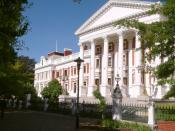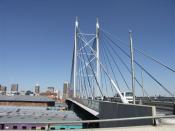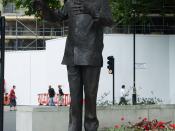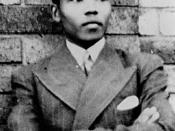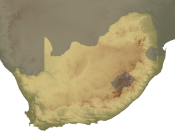People meet the terms industrialization and industrial development so frequently are not they? In many countries the economy is based on these terms and these terms caused to divide the world as new world and the old world. It is possible to separate the world into two parts after industrialization and as it is possible for the world it is possible for countries too. South Africa the shining sun after Mandela and Turkey the pearl of Europe after ÃÂzal can be examples of this separation. Two of the developing countries, Turkey and South Africa divided into two parts too; before and after foreign investments and privatization to develop economy especially industry. Some changes occurred in both of countries' development.. There are some similarities and differences between these countries on the way of development of industry. These similarities and differences should be argued in two parts;; before 1994 and after 1994.
Until 1994 Turkey seems to be more developed country with a more developed industry in contrast with South Africa and after 1994, South Africa started to develop faster than Turkey and it was able to catch Turkey.
Republic of South Africa's industrial development before 1994 is slower than Turkey's industrial development before 1994. Before 1994, there are some problems with the government because of the racist attributes in South Africa and Apartheid regime. Also, the election and management system was not democratic and these were the handicaps on the way of developing the industry. Turkey's economic situation and especially industrial development was better than South Africa's economic situation and development until 1994. In Turkey, there were more job opportunities for people to invest in private sector. Beginning from 1980 the government started to improve the privatization. By the way of privatization both the government and the investors benefited. The government sold some industrial fabrics, which were causing to loose money, to the private companies, who give the highest amount of money. For instance, TESTAàTürk Elektronik San. A.ÃÂ.(30/03/1989), SEK Türkiye Süt Endüstrisi Kurumu(20/05/1992) and T.Gemi Sanayi A.ÃÂ.(10/08/1993) were privatized. (Aug 14, 2001) New job areas occurred for unemployed people. So, we can see that privatization had a crucial part in development of Turkey. If we take South Africa into consideration we see that during the 1970s, 80s and early 90s, the economy in the Republic of South Africa was beleaguered by economic sanctions and policymakers who had little formal training in economics. The leaders followed an attentive policy of low interest rates, which were generally negative. The results of these actions was high money supply growth and inflation (around 15 percent), a growing and spreading budget deficit and domestic debt level, a rejecting currency, and the unavoidable demolition of economic growth and employment. (McClure, Julie Wise, Summer 2000) Moreover, the privatization was not supported in South Africa and also the process of foreign capital was not easy and free so much until the new government came to power. The number of industrial institutions and the number of industrial sectors were less than it is today. Thus, there was not a job opportunity for unemployed people. In Turkey's industrial development the relations with western countries took an important role especially in Turgut ÃÂzal's term. In this term the relations were very good with Europe and particularly with America. The foreigners had chances to have more information about Turkey and they saw that the situation was suitable for investments. So, the foreign capital started to take role in the economic and industrial development of Turkey. Foreign investors began to establish industrial fabrics in Turkey and they sold the license of their products to the native investors like Sabancý and Koç. These fabrics were like job opportunities for public. In Republic of South Africa before the democratic government took place, there were not foreign investments. All the investments were made by government and the laborers were working in the fabrics of sector of government. According to these before 1994 in Turkey industrial development was faster than it was in Republic of South Africa.
After the government was changed in 1994, South Africa developed its economy as Turkey developed, in fact its industry is developing faster than Turkey's industry now. The new government whose president is Nelson Mandela, started a comprehensive program to reconstruct the different sides of economy. A strong investment opportunity was invested by social investment that is made by new government. (Nov 24,2002) ( Also, foreign enterprise process was facilitated and apart from some exceptions, all the sectors of the economy were opened to foreign investments and some encouragement politics was designed. By the way of facilitating the exportation and importation process and decreasing the exportation custom taxes according to the results of World Trade Association Agreements, the exportation and importation of industrial products became easier. Also, they became aware of competition and they realized that to compete with the others in industrial arena, the quality of the work and products should be high. Despite these efforts the development was not good enough to cut into high unemployment and to escape from the economic problems remain from Apartheid Government, such as lack of power between the disadvantaged groups and poverty.(Jan 01, 2002). Apart from these the speed of economic development decreased in 2001, generally because of the slowing of the international economy. On the other side, Turkey had big problems because of the devaluation in 1994 and after 1994 Turkey developed its industry too until the crisis in 1999 and in 2001. But the increase in the ratio of development of Turkey is less than the increase in the ratio of development of Republic of South Africa. Although Turkey has better relationships with developed countries, according to the exportation and importation rates between Turkey and South Africa, it is obvious that Turkey would not be able to develop its industry as South Africa developed as. (April, 2000) But, the ratio of unemployment in South African Republic(30%) is more the ratio of unemployment in Turkey(%7-%8). However both of the countries has been developing their relations with western world. For example, Turkey wants to be a member of European Union and on the other side Republic of South Africa have some relations with European Union such as the Free Trade Agreement with European Union, which come into force in January 2000. Furthermore there are some conflicts in South Africa's economy between the two sides populists in the African National Congress(A.N.C.) and the pragmatists. Pragmatists who are the supporters and the generation of Mandela, think that South Africa's economy should rely on market forces. They believe that South Africa should invest from developed countries, which will both modernize South African industry and provide job areas for the mass of the people. On the contrary, populist wing thinks that the projects of pragmatists on developing South African industry is leading to a White economic supremacy. Populists say that stiff doses of government intervention is needed to decrease unemployment by way of public works. Populists opinion is to improve the industry based both on the equal participation of black and white. (Farley, J.G, Jan 97) Despite this kind of dilemmas, Republic of South Africa objected to destroy the old economy system that was based on import substitution, high tariffs and subsidies, anti-competitive behavior, and extensive government intervention in the economy and they achieved it. (Feb 98) In the first years of development of Turkey and South Africa, both of the countries wanted to foreign investors to enterprise in their country. In Turkey the situation is changed gradually and our investments started to base on native investors' enterprises but in South Africa mentality did not changed and it is still based on foreign investments and market capitalization.
As a conclusion, both of the countries have similarities and differences during their industrial development processes. Before 1994, Turkey's industry was superior than South Africa's economy due to the early entrance of foreign investments. In 1994, the government was changed in South Africa and it was a turning point for South Africa. After 1994, by starting to open the country to foreign investors and improving the relations with developed countries to increase the trade and market capitalization, South Africa developed its industry rapidly. It came to the same level with Turkey, as well it passed Turkey. For both of the countries investments have a big role in industry sector and they are both encouraging the investors. In the future, if Turkey and South Africa goes on developing like today and unless they face with big economic crisis they will always be the candidates to be big powers in the world.
